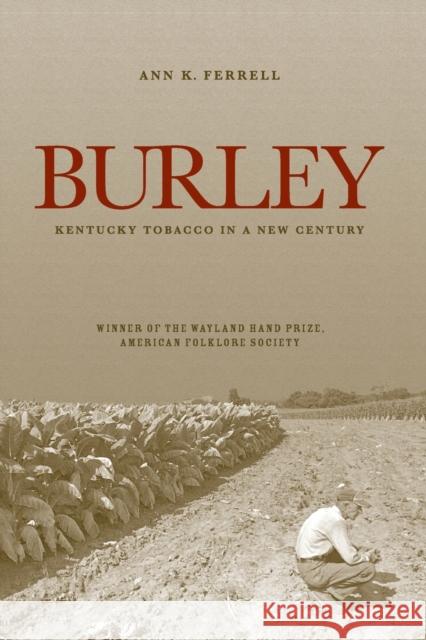Burley: Kentucky Tobacco in a New Century » książka
Burley: Kentucky Tobacco in a New Century
ISBN-13: 9780813167589 / Angielski / Miękka / 2016 / 330 str.
Burley: Kentucky Tobacco in a New Century
ISBN-13: 9780813167589 / Angielski / Miękka / 2016 / 330 str.
(netto: 125,94 VAT: 5%)
Najniższa cena z 30 dni: 131,43
ok. 22 dni roboczych.
Darmowa dostawa!
Once iconic American symbols, tobacco farms are gradually disappearing. It is difficult for many people to lament the loss of a crop that has come to symbolize addiction, disease, and corporate deception; yet, in Kentucky, the plant has played an important role in economic development and prosperity. Burley tobacco -- a light, air-cured variety used in cigarette production -- has long been the Commonwealth's largest cash crop and an important aspect of regional identity, along with bourbon, bluegrass music, and Thoroughbred horses.In Burley: Kentucky Tobacco in a New Century, Ann K. Ferrell investigates the rapidly transforming process of raising and selling tobacco by chronicling her conversations with the farmers who know the crop best. She demonstrates that although the 2004 "buyout" ending the federal tobacco program is commonly perceived to be the most significant change that growers have had to negotiate, it is, in reality, only one new factor among many. Burley reveals the tangible and intangible challenges tobacco farmers face today, from the logistics of cultivation to the growing stigma against the crop.Ferrell uses ethnography, archival research, and rhetorical analysis to tell the complex story of burley tobacco production in twenty-first-century Kentucky. Not only does she give a voice to the farmers who persevere in this embattled industry, but she also sheds light on their futures, contesting the widely held assumption that they can easily replace the crop by diversifying their operations with alternative crops. As tobacco fades from both the physical and economic landscapes, this nuanced volume documents and explores the culture and practices of burley production today.
Once iconic American symbols, tobacco farms are gradually disappearing. It is difficult for many people to lament the loss of a crop that has come to symbolize addiction, disease, and corporate deception; yet, in Kentucky, the plant has played an important role in economic development and prosperity. Burley tobacco-a light, air-cured variety used in cigarette production-has long been the Commonwealths largest cash crop and an important aspect of regional identity, along with bourbon, bluegrass music, and Thoroughbred horses.In Burley: Kentucky Tobacco in a New Century, Ann K. Ferrell investigates the rapidly transforming process of raising and selling tobacco by chronicling her conversations with the farmers who know the crop best. She demonstrates that although the 2004 "buyout" ending the federal tobacco program is commonly perceived to be the most significant change that growers have had to negotiate, it is, in reality, only one new factor among many. Burley reveals the tangible and intangible challenges tobacco farmers face today, from the logistics of cultivation to the growing stigma against the crop.Ferrell uses ethnography, archival research, and rhetorical analysis to tell the complex story of burley tobacco production in twenty-first-century Kentucky. Not only does she give a voice to the farmers who persevere in this embattled industry, but she also sheds light on their futures, contesting the widely held assumption that they can easily replace the crop by diversifying their operations with alternative crops. As tobacco fades from both the physical and economic landscapes, this nuanced volume documents and explores the culture and practices of burley production today.











